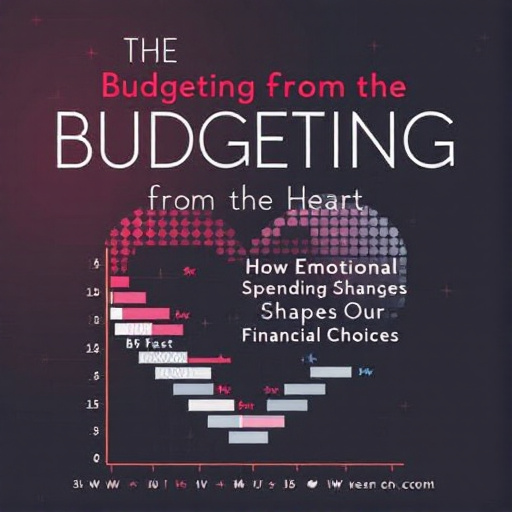Featured Articles
- 8 Essential Cognitive Biases That Sabotage Your Budget and How to Outsmart Them for Financial Success
- "Budgeting Beyond Basics: How Emotions Influence Your Spending Habits"
- Budgeting from the Heart: How Emotional Spending Shapes Our Financial Choices
- "Cryptocurrency and Budgeting: How Digital Coins are Shaking Up Monthly Money Management"
- "Cryptocurrency and Budgeting: How Digital Currency Could Revolutionize Your Spending Habits"
The Psychology of Irrational Spending: Why We Buy What We Don't Need and How to Budget Around It
The Psychology of Irrational Spending: Why We Buy What We Don't Need and How to Budget Around It
People often find themselves purchasing things they don’t need, driven by emotions rather than logic. Understanding the psychology behind irrational spending can help us manage our finances better and cultivate healthier financial habits.
The Emotion Behind Consumption
At its core, spending is emotional. A study conducted by the American Psychological Association found that emotions significantly influence financial decision-making, with feelings like stress, anxiety, or even elation prompting individuals to reach for their wallets with little regard for necessity (APA, 2022).
Marketing: The Catalyst of Impulse Buying
Marketing strategies are designed to tap into our emotions and compel us to make purchases. Retailers often create a sense of urgency by advertising limited-time offers. Who has ever walked into a store and thought, "I need to buy this right now because it’s on sale"? The truth is, that's the retailer’s job—to encourage you to believe that the offer is exclusive and you might miss out.
Case Study: The Theoretical Underpinnings
Take, for instance, the phenomenon known as “loss aversion,” which is rooted in behavioral economics. According to the principles laid out by Daniel Kahneman and Amos Tversky, people are more likely to react strongly to the prospect of losing a certain amount of money than to gaining the same amount (Kahneman & Tversky, 1979). This can lead us to spend irrationally—to avoid the emotional pain of feeling like we missed an opportunity.
The Fun Side of Overspending
Let’s get a bit humorous here. Consider the last time you bought a fancy kitchen gadget that you’ve used twice. You know, that avocado slicer? You’re probably still wondering why you thought it was crucial to have one. Your logical brain is shaking its head while your emotional side is chuckling, “But think of the possibilities!”
Understanding "Retail Therapy"
Many of us engage in "retail therapy," where shopping is used as a coping mechanism to ease stress. A survey from the Journal of Consumer Research indicated that 62% of individuals have used shopping as an emotional outlet (Nunes & Boatwright, 2021). This presents a paradox, though: the happiness derived from the purchase is often short-lived, leading us back to the store for more retail therapy.
Interrupting the Cycle
Are you tired of your bank balance being drained by unpredictable purchases? It’s time to implement strategies to break this cycle. Let’s dive into several effective budgeting techniques that can help you stay grounded amidst temptation.
Create a Monthly Budget
Start simple. Track your monthly income and expenses to create a comprehensive budget. Detail how much you can afford to set aside for discretionary spending, and stick to it like your life depends on it. The 50/30/20 rule is a popular guideline: allocate 50% of your income to needs, 30% to wants, and 20% to savings. This structured approach helps you recognize the limits of what you can spend without guilt.
The 30-Day Rule: A Cooling Off Period
Impulse purchases can be thwarted by a little thing called the 30-day rule. When you feel the urge to buy something not on your budget, write it down and wait 30 days before making the purchase. At the end of that period, ask yourself if you still truly want or need that item. You’ll often find the desire has subsided.
Digital Tools for the Modern Spender
In our tech-driven age, budgeting has never been easier, thanks to numerous apps available at our fingertips. Tools like Mint or YNAB (You Need a Budget) help you keep your finances in check while allowing you to track your spending habits effortlessly.
Mindful Spending: Practical Exercises
Mindful spending entails being fully aware of the reasons and motivations for your purchase. Before buying something, pause and consider the following: Is this item essential? How will I feel about this purchase in a week? Practicing mindfulness can significantly impact your financial decisions, allowing you to align purchases with your values.
The Role of Community and Accountability
Sometimes, sharing your journey with others can reinforce healthy spending behaviors. Join budgeting groups or forums online to find support among like-minded individuals. Posting your goals and progress can create a sense of accountability and promote responsible spending habits.
The Journey of a Young Adult
Let’s meet Sarah, a 22-year-old recent graduate. She found joy in shopping, buying clothes, gadgets, and endless lattes. Until one day, she discovered her credit card bill totaled more than her rent! After numerous sleepless nights, Sarah decided to confront her spending habits. She created a budget, embraced the 30-day rule, and now has a healthy savings account. Not to mention, her once chaotic credit situation is now under control. By sharing her journey on social media, she’s even inspired friends to take charge of their finances!
A Lighter Approach: The Psychology of Spending
Now, let’s add a bit of levity. Ever notice how a flashy advertisement can make that plush dog bed look like a five-star hotel? Marketing wizards understand that a well-placed ad can spark the impulse we mentioned earlier. It doesn’t matter if you have a cat who doesn’t give two hoots about luxurious dog accommodations. The message resonates with that small part of you that thinks, “What if someone sees me with my average dog bed?”
Financial Literacy: Your Best Armor
The more informed you are about financial concepts, the better equipped you become to make rational decisions about spending. Attend workshops, read books, and familiarize yourself with the tools of the trade. One helpful resource is *The Total Money Makeover* by Dave Ramsey, which focuses on overcoming financial hurdles through education and discipline.
Setting Realistic Goals
Establishing achievable goals can provide structure and motivation to adhere to your budget. Whether it’s saving for a vacation or creating an emergency fund, having clear objectives allows you to prioritize your spending. With a definite goal in mind, that irresistible “must-have” item suddenly takes a backseat.
Conclusion: The Way Forward
In the world of financial behavior, irrational spending can feel like a formidable adversary. However, by understanding the psychological triggers behind our purchasing decisions and formalizing budgeting strategies, we can rise above the temptations that often lead us astray. With self-awareness, digital tools, community support, and realistic goal-setting, the path to financial discipline becomes clearer. Every dollar saved is a step toward a brighter financial future.
So go ahead, embrace your budgeting journey. Every time you resist the impulse to buy the latest gizmo, you’re not just saving money; you’re investing in yourself and your future. A life less tied to unnecessary spending is a life well lived!
Remember, stay mindful, stay smart, and happy budgeting!



